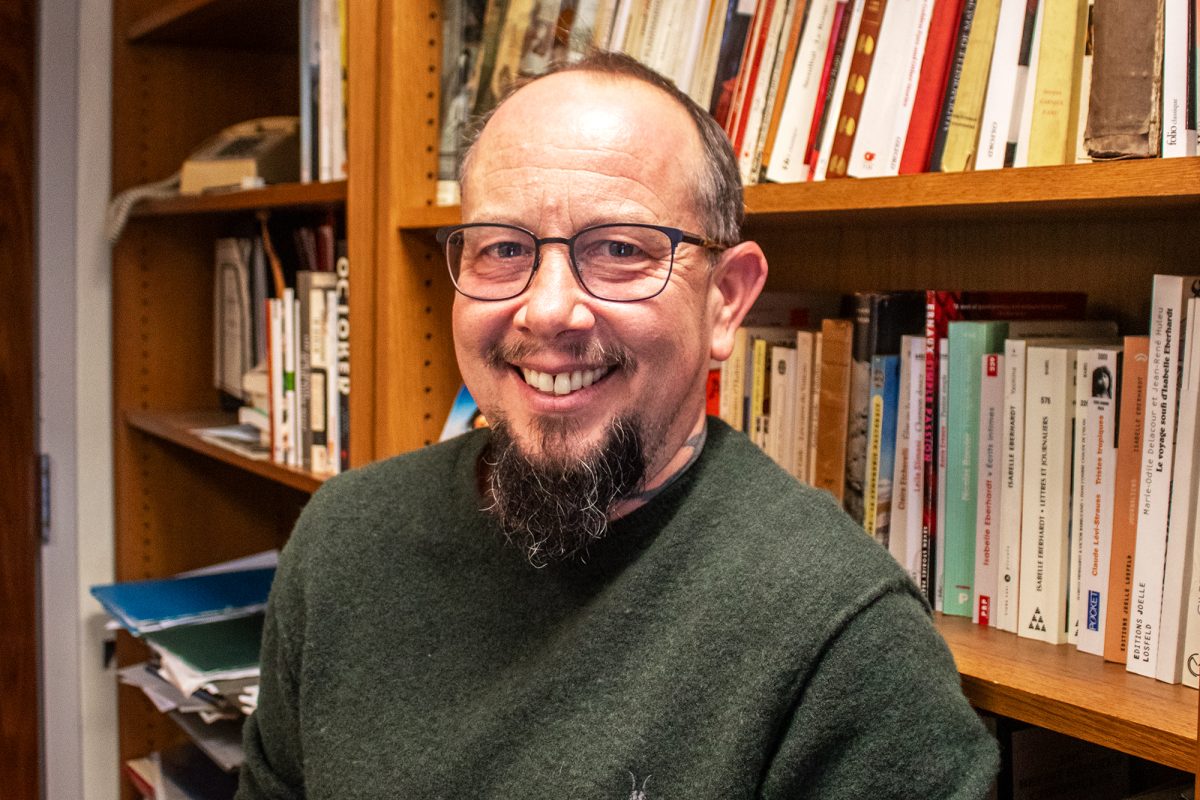Mat Fournier, associate professor in the Department of World Languages, Literatures, and Cultures and an affiliate member of the Women’s, Gender, and Sexuality Studies program at Ithaca College, published a book in November 2024 titled “Dysphoric Modernism: Undoing Gender in French Literature.” It discusses how gender binaries control society, as well as the fact that dysphoria is relevant to anyone regardless of gender and sexual orientation.
His new book is a resource intended for academic audiences with an interest in politics, philosophy, gender and sexuality in French literature. This is his second publication since “Quand La Nature Inspire La Science,” in 2011.
Contributing writer Sadie Evans spoke with Fournier about how he dove back into his French education throughout the writing process of his book and how he pulled from his personal experiences as a member of the transgender community.
Sadie Evans: Could you break down what it means to undo gender?
Mat Fournier: By undoing gender, I knew that I’m looking at the period of time where gender — that is the gender binary, male or female as we know it now — started to exist. It takes many shapes, but in the ’20s [and] ’30s, that’s when we have this idea of femininity and masculinity crystallizing. And they crystallize, of course, as heterosexual. They are complementing one another and [are] entirely different from one another. The [time period] I’m looking at is still emerging, so it’s easy to see how to undo it and [understand] how it took shape. When you’re looking at the beginning of things, when you’re looking at those things that keep crystallizing, [authors] are going to write about contradiction. … For instance, they’re going to talk about same-sex relationships as a way to escape this heavy definition of masculinity. It often has to do with freedom. In the book, I’m looking at explaining how gender and those modern gender definitions prevent freedom and individual difference.
SE: What was your motivation behind writing this?
MF: Dysphoria is my main motivation. I always felt like gender is mostly a way to control people. Dysphoria places us in difficult situations, but it’s also showing us how gender works and doesn’t work. So what I’m arguing in the book is that dysphoria is relevant to everyone, not only those of us who actually feel dysphoria. Everyone can feel the limitations of gender.
SE: How has your French nationality influenced your research?
MF: I found myself resorting to my French training and education during this process. In a way, writing this book was a way to go back to my high school and college education and engage with the French canon. What did these people teach me? And also, what was the limit of their teaching? Because I was always looking into them, [and] I also saw how the definition of the critique of gender is often also sexist and racist. I saw how these people are not seeing colonialism and how they are not seeing the French and European structural racism, because they’re busy creating gender and creating hegemonic masculinity for their own sake. But they don’t say they’re not intersectional at all, and that’s not something I was aware of when I was reading them in college, and that’s not something I’ve been told about them at all. So looking at [these books] again years later helped me see what I learned from them. I saw what they can teach everyone, how they benefit queer theory, but also that their biggest limit is structural racism. I think we still need to read these [historical] texts, but with this understanding that they are enforcing racial representations in mind.
SE: Would you say the Ithaca community has had a strong influence on you and your work?
MF: Yes. I started transitioning when I came to Ithaca and I benefited from the local trans community— particularly support groups — and also the local culture, which made it very possible for me to get hormone replacement therapy, for instance. And I couldn’t have done that in France, and I probably couldn’t have done that in other parts of the U.S., so I’m really indebted to the Ithaca community.









Ruby Kiesewalter • Mar 26, 2025 at 3:26 pm
Beautiful interview and very informative. This is a great way for readers to become more open-minded and learn about different identities and cultures. I’m proud to be a part of such a wonderful Ithaca community. Thanks for shedding a light, Sadie!
gary fouse • Feb 19, 2025 at 9:29 pm
So this is what parents pay astronomical tuition fees for their kids to get four years of this stuffed down their throats?